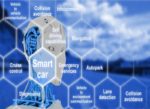Prof. (Dr.) Steve Omohundro, President at Possibility Research based in the United States participates in Risk Roundup to discuss the Rise of Algorithms in Decision-Making.
The rise of Algorithms in Decision- Making
In pursuit of automation-driven efficiencies, the rapidly evolving Artificial Intelligence (AI) techniques, such as neural networks, machine-learning systems, predictive analytics, speech recognition, natural language processing, and more are now routinely used for translation to behavior modeling, robotic control to risk management, decision making, and many other applications. As decision utilities like AI are becoming more popular and more accessible, intelligent algorithms are now rapidly becoming prevalent in most, if not all, aspects of human decision-making.
While decision utilities like AI algorithms have been in use for many years, there are rising concerns about the general lack of understanding of the different types of algorithms: the way that they are used in decision making and their risks and rewards. As a result, ensuring integrity, transparency, and trust in algorithmic decision-making is becoming a complex challenge, particularly for machine learning and self-adaptive systems.
The question today for humanity to evaluate is not whether algorithms are and will remain an aid to the human decision-making process, but whether they will become the ultimate decision-makers. And if AI becomes the ultimate decision-maker:
- How will AI make decisions without losing out on some of the aspects of decision making that is important to humans like transparency, consistency, accuracy, improvement, adaptability, and speed?
- How will AI work to get the outcomes that humans want with built-in accountability and responsibility?
The use of automated AI-based decision-making techniques raises complex security challenges for humanity as a whole — as the right to life, the right to a fair trial, the presumption of innocence, the right to privacy and freedom of expression, workers’ rights, the right to free elections, and the very rule of law is at risk across nations.
Time is now to discuss the risks emerging from algorithmic decision-making!
For more please watch the Risk Roundup Webcast or hear the Risk Roundup Podcast
About the Guest
Prof. (Dr.) Steve Omohundro is a globally recognized scientist developing the next generation of artificial intelligence and is currently President at Possibility Research. Steve has an exemplary innovation record. He is an award-winning professor who has designed the first data-parallel language StarLisp. He co-founded the Center for Complex Systems Research, wrote the 3D graphics for Mathematica, developed fast neural data structures like ball trees, designed the fastest and safest object-oriented language Sather, invented manifold learning, co-created the first neural focus of attention systems, co-designed the best lip-reading system, invented model merging for fast one-shot learning, co-designed the best stochastic grammar learning system, co-created the first Bayesian image search engine PicHunter, invented self-improving AI, discovered the Basic AI Drives, proposed many of the basic AI safety mechanisms including AI smart contracts and so much more. He is based in the United States.
About the Host of Risk Roundup
Jayshree Pandya (née Bhatt), Founder and CEO of Risk Group LLC, is a scientist, a visionary, an expert in disruptive technologies, and a globally recognized thought leader and influencer. She is actively engaged in driving global discussions on existing and emerging technologies, technology transformation, and national preparedness.
Her work focuses on the impact of existing and emerging technological innovations on nations, national preparedness, and the very survival, security, and sustainability of humanity. She believes that the reality of the imminent technological and economic singularity necessitates that Darwin’s evolution theory, a theory that has evolved from natural selection to the survival of the fittest to symbiosis to mutualism be translated and scaled from micro to macro level and understood and evaluated from the perspective of the transformative and evolutionary changes seen across nations (largely triggered due to technology transformation and re-defining and re-designing of systems at all levels). Her research in this context evaluates the evolution of intelligence in all forms, researches strategic security risks emerging from disruptive innovations, reviews the diminishing capacities of the risk management infrastructure, points out the changing role of decision-makers, defines dynamic decision-making approaches with machine intelligence, integrates all components of a nation: governments, industries, organizations and academia (NGIOA), and defines strategic security risks so that nations can improve the state of risk-resilience across cyberspace, geospace and space (CGS). As nations make a move from centralization towards decentralization, the re-defining and re-designing of systems at all levels evaluated in Dr. Pandya’s comprehensive research scholarship include artificial intelligence, machine learning, deep learning, internet of things, blockchain, cryptocurrency, quantum computing, virtual reality, synthetic biology, big data analytics, drones, nanosatellites, biotechnology, nanotechnology, gene editing, and much more. Her research is much needed for the survival and security of humanity today and in the coming tomorrow.
Jayshree’s doctorate work in the 1980s focused on hydrogen production by Halobacterium halobium, for which she received India’s National Young Scientist Award in Biochemistry. Her many publications on this work have been cited in several books, journals, and reports published by governments, including a report from the United States Department of Energy. Her work on anti-cancer drugs also received worldwide attention and, amongst other citations, has been referenced in a report published by the World Health Organization. In 1991, she was invited to come to the United States (under the Scientist Exchange Program) to continue research on hydrogen production and was awarded a post-doctoral fellowship at the Hawaii Natural Energy Institute. After that, she researched atherosclerosis at the University of Chicago Medical School. Next, she took a job at Aurotech, a biotech company based in Wisconsin. As in her Ph.D. research, she used microorganisms to develop natural processes and technologies, and some of the projects she worked on were quite promising. While her doctorate and post-doctorate studies gave her the first taste of the power of interdisciplinary research, it also introduced her to the repressive power of institutional silos and inefficiencies. As a result, her physical location wasn’t the only thing that shifted in the 1990s; her focus did as well. Since Microbiology trained her to see changes in tiny organisms coming from natural selection, she began to see similar forces at work in the evolution of individuals as well as entities across NGIOA and society in general. It’s all the same basic mechanism. Her career took another turn after she was asked to consider risk management as part of a strategic planning effort by one of her employers. She quickly realized that most risk management is all process, with no actual benefit. That was the beginning of Risk Group, the strategic security risk research organization she founded in 2002, from where she is passionately creating and managing cutting-edge security ventures that bring a futurist perspective to nations and all its components to improve innovation capacity and to define and design new ideas, innovations, products, and services for security and sustainability.
From the National Science Foundation to organizations from across nations, Jayshree is an invited speaker on emerging technologies, technology transformation, digital disruption, strategic security risks, industry risks, and country risks. She is the author of the book, The Global Age: NGIOA @ Risk and has also published many scientific and technical papers.
Jayshree advises decision-makers at all levels on existing and emerging technologies: emerging applications, impact, and solutions.
About Risk Roundup
Risk Roundup, a global initiative launched by Risk Group, is a security risk reporting for risks emerging from existing and emerging technologies, technology convergence, and transformation happening across cyberspace, geospace and space. Risk Roundup is released in both audio (Podcast) and video (Webcast) format and is available for subscription at (Risk Group Website, iTunes, Google Play, Stitcher Radio, Android, and Risk Group Professional Social Media).
About Risk Group
Risk Group LLC, a leading strategic security risk research and reporting organization, is a private organization committed to improving the state of risk-resilience through collective participation, and reporting of cyber-security, geo-security, and space-security risks in the spirit of global peace through risk management. Incorporated as a limited liability corporation and headquartered in Sugar land TX, Risk Group is independent, impartial, and not tied to any interests. Best known for its Risk Roundup initiative, Risk Group publishes benchmark Risk Roundup Webcast and Podcast reports on Artificial Intelligence, Machine Learning, Deep Learning, Internet of Things, Blockchain, Cryptocurrency, Quantum Computing, Virtual Reality, Synthetic Biology, Big Data, Drones, Nanosatellites, Cyber-Security, Geo-Security, Space-Security, Cyber Warfare, Electronic Warfare, Dual-Use Technologies. Risk, Risk Management, Resilience, Wearables, Technology Trends, Strategic Security, Futurism, and much more. The rapidly growing Risk Roundup Community is a beacon of hope for the future of humanity.
Copyright Risk Group LLC. All Rights Reserved





 Complex Challenges Facing Connected Cars
Complex Challenges Facing Connected Cars